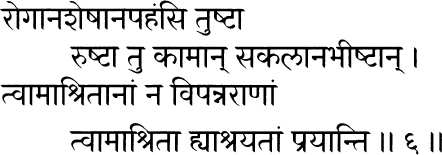

Besides filli ritual chanting of the Devīmāhātmya in temples or on special occasions, less elaborate methods of recitation may be practiced on a daily basis. One of these is to recite the Devīmāhātmya continuously in a seven-day cycle: Chapter 1 on the first day; Chapters 2 and 3 on the second day; then successively Chapter 4; Chapters 5 through 8; Chapters 9 and 10; Chapter 11; and Chapters 12 and 13.1
Another method is to recite the text in a highly condensed form, known as the Śrī Durgāsaptaślokīstotra (“Song of Seven Verses to Śrī Durgā”), or simply as the Saptaślokī Durgā. This consists of those mantras in which the Devī’s power is most concentrated: 1.55, 4.17, 11.10, 11.12, 11.24, 11.29 and 11.39. In a preface to the Saptaślokī Durgā, Śiva praises the Devī’s accessibility and asks the means for accomplishing what is desired. Lovingly, the Devī reveals this song of praise, which she calls the Ambāstuti (“Hymn to the Mother”), saying it is the highest path to spiritual attainment:

jñāninām api cetāmsi devī bhagavati hi sā
balād ākṛṣya mohāya mahāmāyā prayacchati
1. She, the blessed goddess Mahāmāyā, seizes the minds of even the wise and draws them into delusion.

durge smṛtā harasi bhītim aśeṣajantoḥ
svasthaih smṛtā matim atīva śubhāṁ dadāsi
dāridryaduḥkhabhayahāriṇi kā tvad anyā
sarvopakārakaraṇāya sadārdracittā
2. Remembered in distress, you remove fear from every creature. Remembered by the untroubled, you confer even greater serenity of mind. Dispeller of poverty, suffering and fear, who other than you is ever intent on benevolence toward all?

sarvamahgalamāṅgalye śive sarvārthasādhike
śaraṇye tryambake gauri nārāyaṇi namo ‘stu te
3. Salutation be to you, Nārāyaṇi, who are the good of all good, the auspicious one; to you who accomplish every intent; to you, the refuge, the all-knowing, shining GaurT!

śaraṇāgatadīnārtaparitrāṇaparāyaṇe
sarvasyārtihare devi nārāyaṇi namo ‘stu te
4. Salutation be to you, Nārāyaṇi, who are intent on rescuing the distressed and afflicted that take refuge in you; to you, O Devī, who remove the suffering of all.

sarvasvarūpe sarveśe sarvaśaktisamanvite
bhayebhyas trāhi no devi durge devi namo ‘stu te
5. O Devī, who exist in the form of all, who are the ruler of all, possessing all power, protect us from fears. O Devī Durgā, salutation be to you!

rogān aśeṣān apahaṁsi tuṣṭā
ruṣṭā tu kāmān sakalān abhīstān
tvām āśritānām na vipannarāṇām
tvām āśritā hy āśrayatāṁ prayānti
6. When pleased you destroy all afflictions, but when displeased you thwart all aspirations. No calamity befalls those who have taken refuge in you, and they who resort to you become a refuge to others.

Sarvābādhāpraśamanaṁ trailokyasyākhileśvari
evam eva tvayā kāryam asmadvairivināśanam
7. O ruler of all, may you allay all the miseries of the three worlds and so, too, annihilate our enemies.